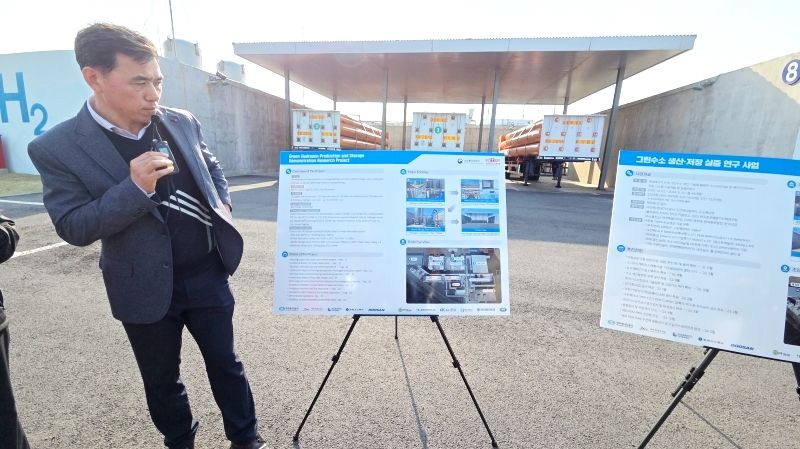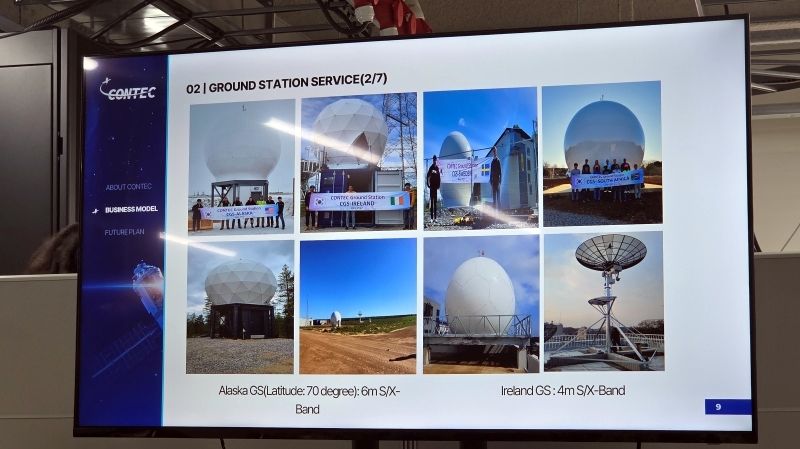Jeju Island in South Korea, known for its natural wonders and tourist attractions, is charting its future with sustainable and environment-friendly industries, including green hydrogen.
Officials of Jeju Province made presentations about the future industries of the island before 62 journalists, including from the Manila Bulletin, from 52 countries who participated in the World Journalists Conference 2025, hosted by the Journalists Association of Korea (JAK) under president Park Jong Hyun.
The participants traveled to Jeju Island to know how the province was planning for its sustainable development.
Jeju Island, with volcanic terrain and surrounded by water, has over 9,000 species of flora and fauna.


Jeju International Airport in Jeju Island, South Korea (Jonathan Hicap)


Jeju Island in South Korea (Jonathan Hicap)


The dinner for participants of the World Journalists Conference 2025 in Jeju Island, South Korea (Jonathan Hicap)
It attracts 13 million tourists yearly and is 1,850.3 sq. km. in size. It has a population of 697,386, consisting of 505,611 inhabitants in Jeju City, and 191,755 in Seogwipo City, making it the least populated province in South Korea.
Its Gross Regional Domestic Product (GRDP) is estimated to be 26 trillion won (about $18 billion).
UNESCO has recognized Jeju Island in four categories: Biosphere Reserve, World Natural Heritage, Global Geopark and Intangible Cultural Heritage of Humanity.
‘The climate crisis is no longer a distant threat’
Jeju Island is establishing a hydrogen-reliable ecosystem for the production, distribution, and utilization of green hydrogen with the aim of combating climate change.
Ambassador for International Relations Lim Ki-mo of the Jeju Special Self-Governing Province presented Jeju’s future industries.
“The climate crisis is no longer a distant threat. Countries around the world are accelerating their efforts to respond to climate change by setting ambitious carbon reduction programs. Jeju has unveiled a bold vision to create a carbon neutral society by 2035, 15 years ahead of South Korea’s national target of 2050,” he said.







Ambassador for International Relations Lim Ki-mo of the Jeju Special Self-Governing Province presents Jeju Future Industry before journalists participating in the World Journalists Conference 2025 (Jonathan Hicap)
“Climate neutrality refers to the idea of achieving net zero greenhouse gas emissions by balancing those emissions so they are equal to, or less than, the emissions removed, as well as accounting for regional or local biogeophysical effects of human activities, such as changes in surface albedo or local climate. In basic terms, it means we reduce our emissions through climate action to ensure no net effect on the climate system,” according to the United Nations Framework Convention on Climate Change (UNFCCC) website.
Lim said Jeju’s aim is to install seven gigawatts of the renewable energy capacity and increase the renewable energy share to over 70 percent by 2035.
To realize carbon neutralization by 2035, Lim said Jeju has set out an ambitious plan covering 81 projects in six key sectors.
One of these is the installation of 400 rainwater harvesting facilities in public buildings. In addition, more than 500 hydrogen commercial vehicles will be distributed along with the introduction of hydrogen trams, a means of eco-friendly mobility.
“To create a carbon-absorbing marine ecosystem of 496 hectares under one forest will also be created equivalent in size to 700 soccer fields. Our energy transition will also increase the share of renewable energy to more than 70 percent of Jeju’s total power generation, producing over 60,000 tons of green hydrogen energy. With these initiatives, Jeju is on the track to completely replace its base rate of power with renewable energy and green hydrogen, establishing an innovative energy portfolio,” he said.
He added, “In October 2024, Jeju was designated as South Korea's first net zero city in recognition of its dedicated efforts to reduce greenhouse gas emissions. Our renewable energy generation share reached 20 percent by the end of last year, significantly surpassing the national average of nine percent and setting a national benchmark in energy transition.”
In addition, Jeju has started producing hydrogen using renewable energy. It can produce 3.3 megawatts of green hydrogen, which can fuel more than 50 hydrogen buses per day.
The green hydrogen production capacity is set to expand to 10.9 megawatts by 2026 and to 30 megawatts by 2030.
Lim said in February this year, Jeju opened the Distributed Energy Support Center, a designation that is expected to enable the nation's first local energy trading market.
“New business opportunities should actually develop in electricity sales,” he said.
He said, “In pursuing carbon neutrality, Jeju has come to move forward, creating new growth industries for the future.”
The journalists visited the Green Hydrogen Charging Facility and CFI Energy Future Hall of the Green Hydrogen Production Facility in Jeju Island.



The CFI Energy Future Hall of the Green Hydrogen Production Facility in Jeju Island (Jonathan Hicap, World Journalists Conference 2025 Secretariat)



The Green Hydrogen Charging Facility in Jeju Island in South Korea (Jonathan Hicap, World Journalists Conference 2025 Secretariat)
Jeju's green hydrogen buses (Jonathan Hicap)
Space industry
“We are now equipping ourselves with growth engines for generations to come, namely the private space industry and urban air mobility (UAS). Jeju is the most ideal location to lead the nation into the space era,” he said.
He said, “Being the region closest to the equator in the country, Jeju offers the most economic conditions for space development. Particularly, the Korea Satellite Operations Center located here in Jeju manages and monitors all satellites launched by South Korea.”
Within just two years of promoting Jeju's space industry, he said, they have made significant progress, including the designation of the Hawon Techno Campus as an opportunity and development zone in June 2024, and a finalized plan for its industrial complex designation in October 2024.
The Jeju Hanwha Space Center, set for completion in October this year, will become a key milestone in the development of South Korea's space industry. Already, 22 companies in the related sectors have expressed intent to move into this space startups, he said.
Contec space company
The WJC participants visited Contec, South Korea’s first space startup to get listed on KOSDAQ, in Jeju.
The company “specializes in providing total solutions for the downstream sector of the space industry, covering everything from the design, construction, and operation of space ground stations to the reception, processing, analysis, and utilization of satellite data.”




Contec Senior Researcher Ustina Yeseul Choi provides information to journalists about the company (Jonathan Hicap)




Contec facilities in Jeju Island, South Korea (Jonathan Hicap)
Contec “has been operating Asia’s only Ground Station as a Service (GSaaS) network, which spans 11 proprietary ground stations across nine countries worldwide.”
It has 24 antennas–15 domestic and nine international–used to provide GSaaS, hosting and signal monitoring for more than 150 satellites in South Korea and around the world.
Senior Researcher Ustina Yeseul Choi of Contec’s International Cooperation Team briefed journalists on the company’s mission and projects.
Contec was founded by Dr. Sunghee Lee, the current CEO, who worked with the Korea Aerospace Research Institute (KARI).
Choi said Contec currently has 12 ground stations and the company is building five more for a total of 17 by next year.
The company’s customers include earth observation satellite operators.
Last November, it announced that it had signed a 10-billion won (about $7 million) contact with Kazakhstan’s Ghalam LLP for the design and development of an earth observation camera for agricultural and environmental monitoring.
Air taxi
Lim revealed that “soon, the nation's first air taxi UAM service for tourists will take off right here in Jeju. Visitors will be able to experience something different.”
“This will create not only direct business opportunities in such areas as aircraft maintenance, flight operations, and infrastructure configuration, but also foster the growth of Jeju's unique tourism ecosystem and innovation related to future mobility industries. In addition, Jeju has been selected as the nation's largest-scale spatial free zone, continuously advancing drone demonstration and service commercialization,” he said.
Jeju’s Drone Demonstration City Project has received four billion won (about $2.75 million) in national funding in five phases.
Part of this project, Lim said, is the launch of a drone delivery service.
During a luncheon for the journalists, Jeju Governor Oh Young-hun said, “In order to move forward to the future, we need a two-track strategy.” He said these are clean energy and AI digital transition.
Oh said Jeju is committed to achieve carbon neutrality by 2035.

Jeju Governor Oh Young-hun (Jonathan Hicap)

Jeju Governor Oh Young-hun (Jonathan Hicap) 
Jeju Governor Oh Young-hun with Journalists Association of Korea president Park Jong Hyun (World Journalists Conference Secretariat) 
Jeju Governor Oh Young-hun (Jonathan Hicap)

Jeju Governor Oh Young-hun with participants of the World Journalists Conference 2025 (World Journalists Conference Secretariat)